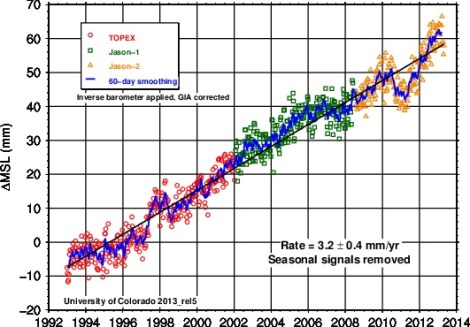Flood-inducing rainfall in Australia in 2010 was so severe that it lowered worldwide sea levels.
Scientists have been puzzled by satellite data that shows sea levels fell in 2011. A paper published this month in the journal Geophysical Research Letters attributes a lot of the surprising sea-level decline to antipodean deluges — record-breaking rainfall that was linked to climate change.
Seas have been rising by about 3 millimeters a year in recent decades. But from mid-2010 until 2011 sea levels dropped by 7 millimeters, as shown in this graph:
Australia is home to geological formations similar to lakes — scientists call them arheic and endorheic basins — that do not flow to the ocean. Instead they empty by gradually evaporating. About 40 percent of precipitation in most continents flows into the ocean, but in dish-shaped Australia, that figure is just 6 percent.
Research led by the National Center for Atmospheric Research using NASA satellite data found that when these Australian basins brimmed with heavy 2010 rains, they held so much water that they contributed to about half of the fall in global sea levels. The basins held the water well into 2012, some of it as surface water and some as groundwater and soil moisture. (A strong La Niña and heavy precipitation over South America and North America also appear to have contributed to the surprise sudden drop in sea levels.)
Seas have recently been rising more rapidly than the 3-millimeter-per-year average — and scientists say that, in turn, could be linked to recent heat waves and droughts in Australia.
“The recent heatwave and accompanying drought very likely depleted soil moisture and perhaps groundwater, so, yes, there is likely a component that is contributing to the current major positive anomaly in global sea level,” said lead researcher John Fasullo. “This is unlikely to be a major contributor to the long term trend, however, as Australia can only dry out so much.”





